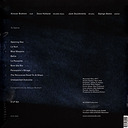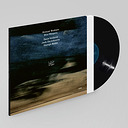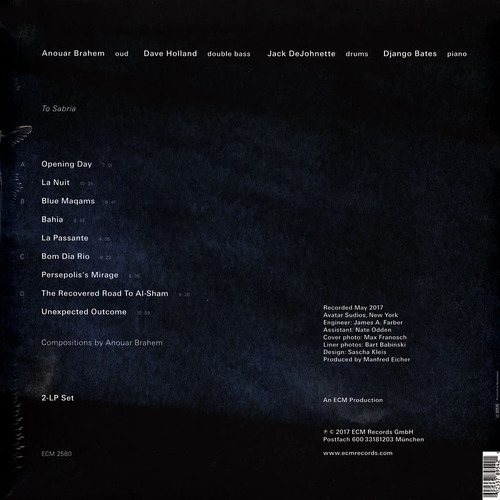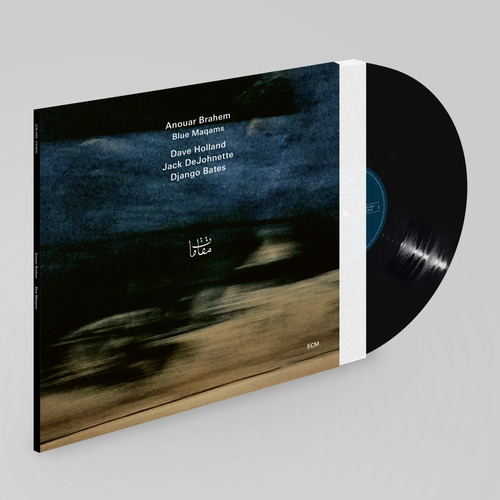Anouar Brahem, Dave Holland, Jack DeJohnette, Django Bates Blue Maqams (2 LP)
- Бренд
- ECM
- Артикул
- 0602557895421/ECM 2580
TAS Super LP List! Special Merit: Informal
180g Vinyl Double LP!
Released on the occasion of Anouar Brahem’s 60th birthday, Blue Maqams offers many reasons to celebrate. Recorded in New York’s Avatar Studios in May 2017 and produced by Manfred Eicher, it brings the Tunisian oud master together with three brilliant improvisers: the “Maqams” of the title refers to the Arabic modal music system, rendered kind of blue by the jazz players. For Anouar Brahem and Dave Holland the album marks a reunion: they first collaborated 20 years ago on the very widely-acclaimed Thimar album. Brahem meets Jack DeJohnette for the first time here, but Holland and DeJohnette have been frequent musical partners over the last half-century beginning with ground-breaking work with Miles Davis – their collaborations are legendary. British pianist Django Bates also rises superbly to the challenge of Brahem’s compositions. And Anouar in turn is inspired to some of his most outgoing playing. Blue Maqams is a highlight of ECM’s autumn season. Live appearances by the quartet will follow in 2018.
Anouar Brahem, born in Tunis in 1957, was ten when he began studying the oud at the National Conservatory in the city, and later pursued his apprenticeship with the great master Ali Sriti. As Stephane Ollivier has written: "Brahem is the ouds conjuror, a master at bringing out the acoustic magic which this age-old traditional Oriental lute carries inside its calabash: the musical heritage of the Arab and Islamic worlds." Brahem undertook a mission to restore the oud to the status of an emblematic solo instrument in Arab music, and at the same time expanded the tradition by working with musicians from other idioms.
"For his intriguing new quartet album, ‘Blue Maqams’, master oudist Anouar Brahem enlisted two fellow legends and a veteran player whose profile is on the rise. […] Not only did Brahem find the perfect collaborator in Bates, he assembled a program of all original compositions that showcases the pianist’s gorgeous touch, with some passages featuring solo piano, as well as duo sections that highlight subtle, intelligent conversations between oud and piano. […] The result is a program that features traditional music from Arab culture as well as more modern jazz elements. Each musician shines here." - Bobby Reed, Downbeat, Editor’s Pick
"‘Blue Maqams’ has no need to pound or poke, finding tranquility in the pragmatic acoustic formula and unblemished technique evinced by the quartet. In these disturbing times, nothing better than listening to music that is congenial, peaceful, and deeply felt. Anouar Brahem delivers all that and more." - Filipe Freitas, Jazz Trail
"For his 60th birthday, Anouar Brahem could not have given himself and us a more beautiful gift than this session in New York in May 2017. [...] The sounds that Brahem creates with his three fellow players shine like stars in the sky above the Media of Tunis. The much-invoked theme of Orient & Occident takes on a new meaning through the way in which a dialogue between oud and piano unfolds here. [...] Since Anouar Brahem's successful album 'Le Pas du Chat Noir' (2002), 'Blue Maqams' is likely to become the record that will appeal most to listeners who are not well versed in classical Arabic music or contemporary jazz. You can hear it here – 'the best of both worlds'." - Karl Lippegaus, Stereo
"‘Blue Maqams’ will not only go down as one of the year's best ECM Records releases; it's a classic-in-the-making that should ultimately be considered one of the label's very best recordings in its nearly fifty-year history." - John Kelman, All About Jazz
"This glitzy lineup features his bass-playing soulmate Dave Holland, drums star Jack DeJohnette, and a wild card in the form of the UK’s Django Bates on piano. The result achieves a spellbinding balance between gently melodic Mediterranean song forms and the one-touch rhythmic elasticity and melodic ingenuity of the best jazz. The presence of Bates (producer Manfred Eicher’s idea, Brahem never having heard the English maverick before) is an inspiration, for his lyrical restraint, creative spaciousness, and diverse references. […] It’s a real meeting of hearts and minds." - John Fordham, The Guardian
"A quiet drum rhythm - and above that the instrumental voice of Anouar Brahem. A blues, so to speak. From Tunisia. This is how the title track of this CD begins - and it is representative. Anouar Brahem, one of the world's most famous players of the Arabic lute Oud, has teamed up with new partners here. They are drummer Jack DeJohnette, bassist Dave Holland and pianist Django Bates. Three world stars of modern jazz. Brahem himself does not consider himself a jazz musician, he avoids common categories. As a composer and improviser, he has found his own tone between Arabic and Western musical traditions - and it is particularly exciting to hear how he moves in this new quartet. He does it in a seemingly self-evident way. And yet not as if he wanted to convince the listeners that the Oud had grown up in the basement vaults of a jazz club and had passed the maturity exam at festivals such as Newport or Montreux. He finds here again a very own sound." - Roland Spiegel, Bavarian Radio
"The album title signifies the union between the incredibly complex Arabic modal and harmonic system and the ‘blue’ so often evoked in jazz improvisation. Throughout, Brahem seamlessly combines the uncommon time signatures, sonic timbres, and whole-tone textures of Arabic music with the dynamic adventure of jazz improv. […] ‘Blue Maqams’ is lovely. It's a nearly perfect illustration of balance between cultural and musical inquiry, underscored by the confidence and near symbiotic communication of this gifted ensemble. This is an exceptional outing, even for an artist as accomplished and creative as Brahem." - Thom Jurek, All Music
"Brahem marries the maqam, scales from classical Arabic art music, with the 'blue' of jazz. On his album, the musicians actually get involved with each other: the jazz musicians record the gentle tone of the Oud in the pieces 'Opening Day' and 'La Nuit', sublimely underline the tones, with a lot of breath and calmness. [...] In the title track 'Blue Maqams', Brahem again approaches jazz. There is a completely different atmosphere: a jazz harmonica discreetly joins the Arab spirit. So this album brings a dialogue, so to speak, on the Western Arabic divan: it can be heard as more than just a piece of worldmusic - a label that Brahem detests anyway." - Christoph Merki, Tagesanzeiger
"The whole session has a tremulous, simmering intensity. The title refers to Arabic modes, the richness of which is grist to the mill of an imaginative composer-improviser such as Brahem, and he draws on them extensively, presenting compositions in which curled, careening melody enhances the strong ensemble voice. However, in the moments when the group breaks down to leave him unaccompanied he excels by way of phrasing that is majestically doleful, conveying moods that are then heightened by gently brushed, mandolin-like yearnings of Bates’ right hand. For both the poise and restraint of the band as well as the beauty of the tonal palette and material this is a strong entry in Brahem’s discography." - Kevin Le Gendre, Jazzwise
"'Maqam', that's the mode in classical Arabic and Turkish music. And these 'Blue Maqams' are Brahem's masterful way of carrying the 'Blue Notes' of jazz to the Middle East." - Ralf Dorschel, Norddeutscher Rundfunk
"His most recent release, ‘Blue Maqams’, showcases his skills in a jazz context – the results are simply stunning. […] We're dealing with musicians who know how to extract every nuance and ounce of meaning from a note. […] As one would expect from a collection of such experienced and gifted musicians, the quality of performance is not only exemplary, it's awe-inspiring […] ‘Blue Maqams’ is a gem of an album featuring four incredibly gifted musicians. […] Anouar Brahem has composed nine amazing works and they are brought to life on this album with amazing skill and grace." - Richard Marcus, Quantara.com
"When I first heard Maqams, oddly enough ‘In a Silent Way’ came to mind, not so much for content, which couldn’t be more different, but in the way both albums wash over the listener, enveloping them in a specific environment, not unlike immersing oneself in a great ocean of spacious sounds, one that, like the sound of the surf, can be put on repeat without tiring of it. Each piece seems to flow inevitably and effortlessly into the next. And there is a connection between these two fine albums: they both have Dave Holland on bass. Holland is like a rock in both settings, laying down the groove and stating the time when necessary, floating when appropriate. DeJohnette, a powerhouse drummer, opts to sit in the background for the most part here, sometimes sitting out altogether, and only showing his formidable creativity and chops in a couple key places. Pianist Django Bates shows particular discipline in the way he interacts with Brahem’s passionate, sensual, yet understated oud. There is not a note that doesn’t belong- the interaction is a precise give and take, sometimes almost call and response, but the two never get in the way of one another. […] I can’t recommend this album highly enough. And I honestly can’t remember the last time I found something so inherently listenable that I just put it on repeat while hanging out at home. Yet putting one’s entire concentration on the music yields vast rewards. It is that good after all!" - Brian Whistler, Manafonistas
"From the very first moments – ‘Opening Days’ begins with a characteristically delicate, thoughtful solo introduction from the leader’s oud – the music is unmistakably Brahem’s; but within seconds you know this is also going to be something rather different. Joining the oud, first we have Dave Holland’s rich, thumping bass; then the crisp, light, swinging accompaniment of Jack DeJohnette on drums; and finally, a couple of minutes into the track, Django Bates’ piano makes its magical entrance, fittingly lyrical yet significantly ‘jazzier’." - Geoff Andrew, Notes & Observations
"The melodies of the Arabic musical traditions form the basis. In interplay, they transform into wonderful music that calms the spirit of the world." - Pirmin Bossart, Cultural tip
"Since the beginning of the 1990s, the Tunisian oud virtuoso and composer Anouar Brahem has released a dozen excellent albums on his house label ECM in a wide variety of ensembles. Consequently, in his case, the expectations of the fans before new releases are particularly high, but they should rarely have been fulfilled or even exceeded as fully as with 'Blue Maqams'. [...] In the nine Brahem compositions, which, with a few exceptions, range from eight to eleven minutes in length, Holland and DeJohnette put their sovereign technique, which has grown over decades, and their incredible empathy paired with an inexhaustible musical ingenuity at the service of the cause. Holland lets his bass sing that it is a joy, and DeJohnette achieves the greatest effect with the most economical means. Brahem and Bates shine with beautiful solos, ensnare each other in subtle dialogues and inspire each other to brilliant top performances. Arabic music and contemporary jazz meet here absolutely on an equal footing, the actors draw from the best of two musical worlds, without disavowing one or the other." - Peter Füssl, Culture
"A North African, an American, a Briton and a British Ami drive a common vehicle by simply indulging in the dramatic magic of sound, free of all the phrases and platitudes between improvisation and meditation." - Wolf Kampmann, Stereoplay
"The music of the Oud virtuoso Anouar Brahem (Oud is the Arabic short-necked lute) is difficult to classify and easy to understand. One can settle in it without preconditions, as in a well-tempered ambience, as in a musique d'ameublement, even the misconception 'world music' may seem obvious to one or the other, even if Brahem, born in Tunis in 1957, vehemently (and rightly) defends himself against etiquette. At the age of ten, he began studying Arabic music, soon with the legendary teacher Ali Sriti. Then followed a gradual broadening of horizons, also in the direction of jazz, although he sees himself "neither as a jazz musician nor as a jazz composer". in 1991 he recorded his first recordings for Manfred Eicher's ECM label, which subsequently became his musical home and helped to determine the development of his cross-border music: productions with musicians such as Jan Garbarek ('Madar', 1994), Richard Galliano and François Couturier ('Khomsa', 1995), John Surman and Dave Holland ('Thimar', 1998), also with various classical orchestras (most recently 'Souvenir' , 2014) – Brahem had his head in the creative wind, wherever it was blowing, and yet he never betrayed his origins, certainly not by dissolving the contours in the sense of a perfumed exotic everyday music. His meditative spaces invite the partners to intense, wide-stretched breathing arches, but never to any ego trips - for this he insists too rigorously on the constant connection to the composed specifications. This is also the case on his recent opus 'Blue Maqams', in which his great old partner Dave Holland is involved on the double bass, the fabulously discreet, subtle, differentiated Jack DeJohnette on a floating drum set and the British pianist Django Bates, with all his technical brilliance, successfully taking care not to pleonastically pour the rooms of the almost scrupulously economical partners. This creates a highly poetic, never emotional, always heartwarming own music between the categories and between the worlds. A very special kind of Blue." - Peter Rüedi, Die Weltwoche
"Il revient aujourd’hui à ses premières amours transversales en signant un disque magnifique entièrement animé par sa passion du jazz. Retrouvant pour l’occasion Dave Holland à la contrebasse, magistral de fluidité et de profondeur, Brahem prend le risque de réintroduire la batterie dans l’équilibre si fragile de son univers évanescent, confiant à Jack DeJohnette le soin d’adapter tambours et cymbales aux dynamiques subtiles de sa musique. Le résultat est un modèle de musicalité et de féérie sonore minimaliste. Convié également à la fête, le pianiste anglais Django Bates, dont on aurait pu douter a priori que sa personnalité volontiers décalée et extravagante convienne à ce genre de projet intimiste, est la grande et bonne surprise du disque. Transfigurant par la magie de son toucher les parties très écrites des compositions modales envoûtantes de Brahem, le pianiste fait par ailleurs preuve d’une inventivité et d’une inspiration constante, apportant à l’ensemble la richesse de ses harmonies et la vivacité de son phrasé. (...) De son côté n’a jamais semblé aussi maître de son discours, trouvant constamment la bonne balance entre sensualité et abstraction. Une réussite totale." - Stéphane Ollivier, Jazz Magazine
"So how does Brahem’s Arabic modal music background mesh with these jazz masters? Will one drown out the other or will they meet in the middle? Often Brahem begins tracks with solo oud and the players gradually come in (or, on ‘La Passente’, the track never ignites, but smoulders gently throughout). So no clash there. But the title track begins with drums and here Brahem’s oud functions like a guitar, beautifully intertwining with Bates’s piano until everything else drops away, then re-emerging to resolve the piece at the end. It is one of serveral places where the two forms show utmost respect and bring the best out of each other. […] this album works on several levels. Its jazz, exotic mood is unobtrusive and enjoyable as background, but start to go deeper and there is so much to explore in this musical meeting of worlds." - Derek Walker, Church of England Newspaper
"Delicacy is the strongest pillar of Anouar Brahem’s music […]. The subtle timbre of his Arab lute requires that the other instruments that accompany him are equally discrete. […] But the softness goes beyond his characteristic style, which mixes Arabian traditions and jazz, and is also the essence with which he understands music. Almost everything that is heard in this album, he says, was conceived “in the magic of a moment of inspiration”, without much planning, but with aroused sensibility. […] each piece is a particular universe that emerges from small ideas." - Alejandro Mendoza Arriaga, El País
"With a title that sums up its mix of complex but melodic Arabic modes and the so-called blue notes of jazz improvisation, this album by Tunisian oud master Anouar Brahem is part world fusion, part work of art. [….] These 10 improvisations see the maestro challenged by changes in tempo and exercises in swing, bossa nova and solo invention. But always, the oud is granted freedom to fly. Sublime." - Jane Cornwell, Evening Standard
"The story of the convergence of second musical spheres in a balancing act of beauty." - Stefan Hentz, Die Zeit
"Brahem's companions this time are the British bassist Dave Holland (71), with whom he played 20 years ago, and the legendary drummer Jack DeJohnette (75), who played on Miles Davis' epochal album 'Bitches Brew' in 1969. Added to this was an idea of Eicher, pianist Django Bates (57). The Briton is playing with Brahem for the first time – a spirited, edgy contrast to his longtime partner at the piano, Francois Couturier. This has an effect – in addition to dreamy, meditative passages such as in the title track and in 'La Nuit' there are expressive, energetic improvisations [...] A magnificent album that defies any categorization." - Jens-Uwe Sommerschuh, Saxon Newspaper
"What is clear from this recording as a whole is that Anouar Brahem has a clear vision of what he is seeking to achieve and the musicians on board this project are of a sufficiently high caliber to deliver the goods with aplomb. An outstanding recording that easily fits into the best albums of the year category." - Tim Stenhouse, UK Vibe
"A very conciliatory album directed by the Munich sound master Manfred Eicher." - Janko Tietz,Literary Review
"A record with beguiling, almost hypnotizing music." - Johannes Kaiser, Südwestrundfunk
"Oud-master Anouar Brahem's instantly intoxicating ‘Blue Maqams’ caps off a truly remarkable year for ECM Records. […] A maqam defines traditional Arab musical phrases, tones, notes and melodies but eschews control of rhythm, making all these blue maqams, these tightly composed universes, light years of inspiration and interpretation for Brahem's three daring cohorts, bassist Dave Holland, drummer Jack DeJohnette and the mischievous creativity of pianist Bates. They deliver non-stop." - Mike Jurkovic, All About Jazz
"It is a masterpiece, because the Blue Notes of jazz have perhaps never been so conclusively and unobtrusively connected with the modal music of Arabia. Here, freedom and reverence for tradition meet as a matter of course." - Ulrich Steinmetzger, Berner Zeitung
"The characteristics of Brahem’s native Tunisia are apparent in the ostinato rhythms, cyclical scales and horizontal organization. Underneath is a power that comes from the subtle individualism of the music. This is not a fusion, but a holistic synthesis of traditional North African musics, jazz and improvisation. […] Brahem’s improvising is relaxed, each note full of purpose. Credit the rhythm section for seamlessly following the 60-year-old leader. Everyone handles the pattern-based forms with an easy flow. No surprise with bassist Dave Holland, who has a monumental sound, and Jack DeJohnette’s trademark ticking cymbal sound is there, but in all other ways the drummer is so deeply submerged into the aesthetic that he sounds like an entirely different musician. […] This is a long album that’s constantly absorbing and affecting." - George Grella, Downbeat
"It’s seldom clear what’s traditional and what modern in Brahem’s music, because it constantly wanders between – and thereby dissolves – these reference points. It’s a sensibility he shares with the Palestinian poet Mahmoud Darwish, to whom he dedicated his 2009 album ‘The Astounding Eyes of Rita’. Like Darwish’s ‘lyric epic’, Brahem’s music suggests that there is nothing more modern than a tradition that has been given new life. An embrace of the new is also the road home for an improvisatory tradition that has drifted astray from its exploratory roots. (The title of one track, ‘The recovered road to al-Sham’, an allusion to Syria, suggests that innovation and freedom might heal other forms of exile.) The mood throughout ‘Blue Maqams’ is one of restless transformation and searching, as the music’s different elements combine to form a new alloy that floats free of its hybrid origins, but never forgets them." - Adam Shatz, London Review of Books
"This is a gently exquisite album, in which the finest and most innovative oud (lute) player in Tunisia is joined by three of the most skilful improvisers in the jazz world today […] There are passages where the subtle oud playing is echoed by thoughtful piano work, and others where the piano takes the lead, or a repeated bass line is used to underpin the oud and piano improvisation. It’s a thrilling meeting of master musicians." - Robin Denselow, Songlines
"The perfect balance between composition and improvisation [...] This is how 'Bom Dia Rio' starts the musical dialogue with brittle charm, solo on the Oud. Holland's bass starts with a small, nimble figure. The pianist sprinkles in a few chords, records the melody and DeJohnette primes all this with the finest brush strokes on cymbals and drums. A masterpiece of deceleration." - Andreas Collet, Badische Zeitung
"Poetry is the key word of this encounter, which changes atmospherically into ‘La Nuit’ with quiet cymbal crashes, whereby a piano monologue even touches atonal areas. The title song has almost pop qualities and 'Persepolis's Mirage' has an intense ostinato groove." - Hans-Dieter Grünfeld, HiFi & Records
"For ‘Blue Maqams’, his tenth LP on the venerable ECM label, Tunisian oudist Anouar Brahem shifts away from the grand concepts that drove his previous album Souvenance, instead convening a jazz trio. And what an ensemble it is, too. Veteran British pianist Django Bates (Bill Bruford, Tim Berne) takes the chordal helm, with Jack DeJohnette and Dave Holland – perhaps the greatest living rhythm section in jazz – providing supple support. Melody rules here; Brahem’s ability to blend jazz changes with the Middle Eastern tonalities of his homeland gives each song a distinctive tone, accessible yet challenging. […] Masterfully performed and arranged, ‘Blue Maqams’ is a record of great beauty and fire." - Michael Toland, Blurt
Features:
- 180g Vinyl
- Double LP
- Audiophile High Quality Pressing
- From The Original Analog Tapes
- Recorded at Avatar Studios, New York, May 2017
- Limited Time Download Code
- Gatefold Jacket
- Made in Germany
- Anouar Brahem, oud
- Dave Holland, double bass
- Jack DeJohnette, drums
- Django Bates, piano




